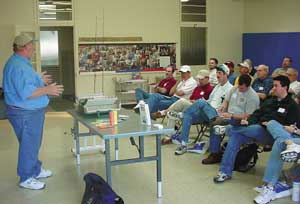
If you aren’t a striper or bluefin fisherman or one of those dedicated anglers who chases speckled trout and red drum all year, then the winter months at the North Carolina coast are a slow time.Even if you prefer the warmth radiating from your fireplace to trying to get gloved fingers to cooperate with stubborn cold tackle, there are things you can do to help make yourself a better fisherman when the warm spring breezes beckon you outside.
As you’ll see in the coastal fishing forecasts in this issue, not only is this the coldest month of the year, but for most fishing, it’s also the slowest. For those of you who, like me, have gotten a little wiser with the (many) passing years, winter months typically serve you better as a time of preparation rather than participation.
My point? Make use of this time. There are things you can be doing that are fun that don’t directly involve netting a bass or trout.
Fishing is supposed to be fun, and I’ve found that those things that more closely resembled work were more likely to be put off than those things that were fun. I’ll list my ideas in that order too and make them the last things mentioned.
One of the easiest and potentially most fun things to do is attend boat and fishing shows. If you think ahead and plan well, you can even convince your wife you’re looking out for her interests by attending one of these shows.
Work with one of your fishing buddies to plan an afternoon for your wives to go shopping. Either you can drop them off at the mall or they can drop you off at the show and you can both enjoy an afternoon doing something you like, then get back together and enjoy a nice meal before heading home. If you do it right, you can make points for thinking of her and still get to do what you enjoy.
When visiting a boat or fishing show, you always should find something that catches your eye or imagination. If you don’t spot interesting items regularly, slow down; you’re moving too fast and not paying attention.
I’m not saying to get caught up in a salesman’s spiel, but there may be something in one that makes you think.
During the winter months there are boat shows, fishing shows, outdoor shows and hunting shows. Their names suggest their focus and anglers should consider the first three.
Boat shows are for selling boats but usually have a limited amount of tackle and accessory booths at the edges of the facility. Fishing shows are for selling fishing supplies and accessories but still have a small selection of boats for sale.
Outdoor shows have a cross section of many types of outdoor activities, without focusing on any one idea. Fishing shows usually have a few fishing seminars and outdoor shows may offer a variety of them.
Some of the best time you can spend during the winter is a Saturday at a North Carolina Sportsman or South Carolina Sportsman Fishing School. These events bring charter fishermen, guides, professional and tournament anglers, knowledgeable local anglers, pioneers in fishing accessories, factory representatives and more together for a fun and information-filled day.
A North Carolina Sportsman Fishing School will be held March 17 at the Barwell Road Community Center in Raleigh. A South Carolina Sportsman Fishing School will be held March 31 at the Denny Terrace Community Center in Columbia.
Both schools are co-sponsored by the local Recreation Department. They are purposely scheduled for just after the boat and fishing shows end and before fishing season begins, so you have seen the new equipment and can ask questions regarding using it. It also allows those of us who have “senior moments” to use the information and commit it to memory before we forget it.
These schools are all-day events, beginning at 9 a.m. and continuing until 4:30 p.m. They use as many as six classrooms to offer multiple sessions each hour. Every hour at least one topic covers the general subjects of inshore saltwater, ocean saltwater, freshwater, general information and useful outdoors equipment.
Many of the more popular topics are repeated during the day. The sessions change each hour and participants can select their preferred topic or even leave one classroom halfway through the seminar to try another seminar.
The basics of the schools are the same, with some topics and techniques tailored for best use in each state.
Detailed information about the NCS and SCS fishing schools is available elsewhere in this issue, by calling 1-800-538-4355, or by visiting www.northcarolinasportsman.com or www.southcarolinasportsman.com.
Now that you’re raring to go fishing, the days on the calendar begin to creep by with an uncanny slowness. Servicing rods and reels, doing pre-season maintenance on boats and trailers and any other fishing chores you put off from last fall will help burn off some of your excess adrenaline and actually help the time pass quickly.
Individuals priorities for boat maintenance; I like to get my boat and trailer ready first.
It’s time to clean and pack wheel bearings, replace lights or bad wiring, check every nut and bolt on the trailer for tightness and look for anything out of the ordinary.
As for the hull, I do fiberglass and gel coat repairs as the weather allows and fix other things around it. It’s a good time to replace a squeaky baitwell pump, check hoses and connections, test fuses or circuit breakers, replace suspect wiring and add equipment you’ve collected during the winter.
Marine electronics are constantly evolving and you may decide to update yours at any time. It’s a good time to create backup waypoint logs (computer files and hard copies) of all the new places you found last year and never logged to the hard drive.
Finally, you’ll need to clean and service rods and reels. You really should have done it right after you quit fishing last fall, but you didn’t and we’ll do the best we can.
The reason it’s better to do this sooner is any salt picked up by the line or pushed into your reel any other way could start corrosion you might not be able to stop.
The first thing to do is remove line. Don’t just throw it away. Take it to one of the tackle shops that has a line recycling collection box and deposit it there.
Step two is to clean reels with mild detergents and mild solvents. Use the detergents to clean the outside and allow reels to dry. Third, disassemble the reels and clean interiors with a mild solvent. Be careful and don’t use abrasive or harsh cleansers.
There are plastic parts in many reels that acetone and gasoline will damage. Kerosene is usually an excellent choice for cleaning reels and is readily available.
After cleaning gears, bearings, etc., in reels, give them a good visual check for wear and other damage. If anything seems out of the ordinary, replace that part.
Once old grease has been removed, the parts inspected and any replacements inserted, it’s time to begin lubricating parts and reassembling the reel. A simple rule is to lubricate everything that moves except the drag plates and drag washers.
Several manufacturers have their own lubricants for their reels. Penn recently teamed with X-1R Products of Daytona Beach to produce a line of lubricants designed expressly for fishing reels in the saltwater environment. You may be familiar with X-1R and its line of auto-care lubricants, but the company also has a long history with NASA and the U.S. space program.
Don’t replace line immediately unless you must to go fishing. During the spring, many tackle shops offer line-winding specials; you can refill reels with fresh line at discounted prices.
If you don’t feel mechanically capable of cleaning and servicing reels, most tackle shops r service and repair rods and reels, have a repair service they collect items for or can recommend someone local to do the work. For those wanting factory-trained technicians working on their equipment, most manufacturers have authorized regional repair centers and/or offer repair and servicing in-house. Contact the manufacturer directly for details.
Rods are much easier to inspect.
The first step is to remove the reel, then visually examine the entire rod, reel seat and butt for cracks or oddities. Once a rod passes visual inspection, I rub it all over with a cotton ball, paying extra attention to pull the cotton through the guides. If there are any imperfections (chips, nicks, cracks, etc), strands of cotton will hang onto them.
If you’re not comfortable attempting to repair rods, most tackle shops can help, plus there are custom rod-builders at many coastal towns and some manufacturers also offer repair service.
The winter is also a great time for checking out current tackle and replacing possible problem areas.
You also can make rigs and get a head start on the upcoming season. Those week-day nights and rainy Saturdays usually spent watching ACC basketball can be used to make rigs. With a TV tray in front of your recliner, you can make up a few rigs each day and be ready when the season begins.
Be careful not to get too upset with a referee’s call and slam you hand down into a box of hooks. Ouch.
If none of this works for you, you can always take a Capt. Jerry’s Flyfishing Trip to maintain your edge. This isn’t your usual flyfishing trip and may or may not actually involve flyfishing. My version is to get on one of those big silver birds and go somewhere warm and go fishing.
I guarantee it will help your attitude and probably improve your abilities.
Whatever you do, don’t allow the winter to get you down; there’s plenty you can do to make yourself a better and better prepared fisherman.




Be the first to comment